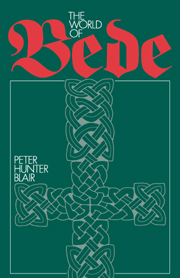Book contents
- Frontmatter
- Contents
- Foreword by Michael Lapidge
- Preface
- List of Abbreviations
- PART ONE ALTER ORBIS
- PART TWO TOWARDS CHRISTIANITY
- PART THREE THE GROWTH OF MONASTICISM
- PART FOUR LEARNING, TEACHING AND WRITING
- 19 The Regular Life
- 20 The Bible in the West
- 21 The Northumbrian Bible
- 22 Education and the Grammarians
- 23 Reading and Psalmody
- 24 Number and Time
- 25 The Lives of Saints
- 26 Secular and Christian Books
- 27 Candela Ecclesiae
- Select Bibliography
- Index
23 - Reading and Psalmody
Published online by Cambridge University Press: 02 February 2010
- Frontmatter
- Contents
- Foreword by Michael Lapidge
- Preface
- List of Abbreviations
- PART ONE ALTER ORBIS
- PART TWO TOWARDS CHRISTIANITY
- PART THREE THE GROWTH OF MONASTICISM
- PART FOUR LEARNING, TEACHING AND WRITING
- 19 The Regular Life
- 20 The Bible in the West
- 21 The Northumbrian Bible
- 22 Education and the Grammarians
- 23 Reading and Psalmody
- 24 Number and Time
- 25 The Lives of Saints
- 26 Secular and Christian Books
- 27 Candela Ecclesiae
- Select Bibliography
- Index
Summary
We do not know whether Bede held any of the minor orders before his ordination to the diaconate, nor indeed do we hear anything directly about these minor orders in the context of Wearmouth and Jarrow, but from Spain we have Isidore of Seville's list of the six orders below that of deacon, with his definition of their several functions, beginning with the doorkeeper (ostiarius) and passing thence to acolyte, exorcist, cantor (whom Isidore calls psalmista) lector and subdeacon. We can hardly doubt that, whether formally or not, Bede would in his early days have performed the functions of both lector and cantor. It must be remembered that the reading of sacred books, the end to which the study of grammar in the monastic schools was devoted, involved the reading aloud to the community of the Bible and some of the works of the Fathers at certain times of the day which would be prescribed in the monastic rule. The lectors, in Isidore's view, are more than mere readers. They are those who announce or preach the Word of God and for this reason they needed to be well-trained to perform their task properly. Isidore's remark that their knowledge of grammatical structure had to be sufficient to enable them to know when the sense of a group of words was complete, and when it carried over into an adjacent group of words, helps us to appreciate the real difficulty of reading aloud in a foreign language, often no doubt by the poor light of the candle, from a book which was written by hand and which might well have had no punctuation.
- Type
- Chapter
- Information
- The World of Bede , pp. 253 - 258Publisher: Cambridge University PressPrint publication year: 1990



